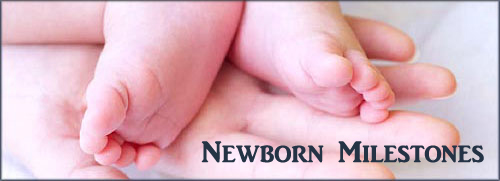
Newborn Development Guide: The Most Important Infant Milestones
In this article on newborn development you will get a long list of infant milestones regarding:
- The physical development of your baby which contains a list of newborn reflexes, insights into expected early sleeping and eating patterns along with information on infant sensory development.
- The psychological and
cognitive development of your infant and how this relates
to your baby's first attempts of communication.
- The emotional and social development of your baby - how your baby not only learns new skills and abilities through interaction but also how the first important seed of self esteem is planted right from infancy.
But before we venture on this
exciting journey, let me say a few words about how you as a
parent might choose to approach baby development.
Remember, Your Child is Unique!
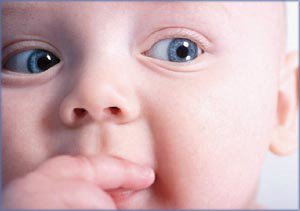 When we have a baby, it is very natural to want to seek confirmation that our baby is
'normal'. That our baby is growing and developing according to
the general guidelines of newborn development.
When we have a baby, it is very natural to want to seek confirmation that our baby is
'normal'. That our baby is growing and developing according to
the general guidelines of newborn development.
However,
it's also important not to forget that general guidelines are,
well, 'general'. They give you an indication of what is
considered average.
However, your child does not know
or care about average. Your child is his or her own person -
one-of-a-kind!
So when seeking information about infant
development, it is important to remember that babies
develop at different rates.
Your child is unique, so
the way he or he grows and changes will also be unique.
The most important tool you have when it comes to
determining whether everything is as it should be is your
instinct, your gut feeling.
If your baby doesn't
'perform' according to the development guidelines, but
your feeling is that everything is as it should be, then
everything probably is as it should be.
As a mother I experienced this discrepancy between
general development guidelines and my son's own
development time and time again.
E.g. the baby
development books would say that 'now your baby should be
reaching out for stuff!'
Well, for one thing my baby
wasn't reaching out when he was 'supposed' to.
However, I knew or felt that my son simply was not interested
in reaching out (yet). He would much rather just look and
connect through deep eye contact.
So nothing was wrong with my
son's development scheme, he was just his own person
and didn't fit the 'general' newborn development guidelines.
Remember, no matter how 'authority'-like the books about infant milestones may seem, they don't
know your child.
Only you do!
Trust that and
trust yourself!
Imagine, the Only Thing You Recognize in This World Is a Voice!
Giving Your Infant Space and Love to Adjust!
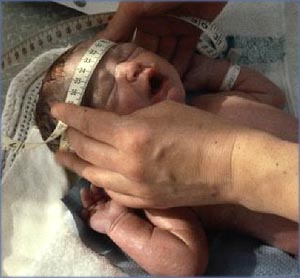 For a moment, let's take a brief
look at newborn development from your baby's perspective:
For a moment, let's take a brief
look at newborn development from your baby's perspective:
Your infant has been removed from his or her snug, cozy
environment of being 'one' with you or his mother, in total
unity, and then thrust into a world of separation, overflowing
with invasive stimuli.
Your baby is suddenly being
bombarded with sound and light, temperature changes, and new
faces.
And, if that isn't overwhelming enough, your
baby now has to learn how to breathe on his own, eat through
his mouth, and sleep in unfamiliar surroundings.
This
is probably the biggest change (and trauma) in experience we
as humans will ever encounter until the day we leave this
earth.
So being born is no small deal at all!
Also as an adult, you have had months to prepare for the
arrival of your little one. But your baby had no idea what was
coming.
Your baby wasn't given the benefit of infant
milestones books, newborn development websites, and baby care
classes that told him what to expect.
Your baby
doesn't know that he is supposed to be able to his head by
four weeks, smile at two months, or walk at a year old.
And really, he couldn't care less about
development! :-)
All he knows is that his world has
completely changed, the only voice he recognizes is his
mother's, and he desperately wants to be snuggled back in the
security of the womb where he can be one with you (or his
mother again).
Pour in Unconditional Love and Watch Your Baby Explore and Learn!
While a lot of
development is innate – your baby has certain built-in
reflexes that help him learn and adapt.
However, one of
the top most important aspects of successful newborn
development, growth and progress depends not on working hard
on stimulating your child to develop according to the 'ideals' but on helping your infant feel safe and
secure in a very big – and sometimes scary – world.
You
see, from the moment your baby is born, he naturally uses his
well-tuned senses to learn about his new world.
But in
order for your child to actively pursue exploring and learning
(and thereby reach what is considered key infant milestones),
you baby must feel safe, secure and loved.
He must
intuitively feel that "Everything is good and nothing bad will
happen to me!"
When your child has developed what in
developmental psychology is called
secure
attachment, he will feel 'free' to explore the
world because he intuitively 'knows' that the world is good
place and people mean well and can be trusted.
It May not Seem as Much from the Outside, but Your Baby's Brain Is Faster than Ever!
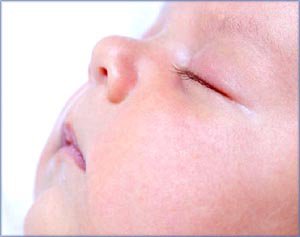 Most of us are influenced by first
impressions, and your baby is no different.
Most of us are influenced by first
impressions, and your baby is no different.
Your
baby's earliest experiences of himself and the world lay the
foundation upon which future concepts, skills and self image
are built.
To you, it may seem that all your infant
does is eat, sleep, and cry, but their little brains are
actually absorbing an abundance of information that will be
used over the next several months to determine physical,
cognitive, and social development.
Katy Holland,
author of Your Baby From Birth to Six Months, states:
- "Your baby's development doesn't happen in isolation from the rest of the world; he can only learn and progress by being part of it. Having you, your partner, siblings, friends, and family members there is fundamental to his learning and developing. Not only does he learn by example, he needs acknowledgement, love, and encouragement from the people around him in order to reach his full potential. So, by doing what comes naturally – cuddling him, talking to him, going to him when he cries, and interacting with him – you are giving him a sense of security and confidence that allows him to blossom."
The first month of your baby's life is a time of significant growth and change. Even at this young age, your newborn's development will usually be measured in three major categories:
- Physical development
- Psychological and cognitive development
- Social, emotional development
I will now take you through the most
significant infant milestones.
The Physical Development of Your Infant
Reflexes, Sleep and Senses
Your new little bundle of joy
enters this world with wrinkly skin, a scrunched up face, and
a curled up body.
The reason your baby is all curled
up is because he has been in quite confined quarters for
several months and is used to having his legs drawn up and his
arms tucked into his body.
As your baby adjusts to his
new, larger environment, he will gradually stretch and
straighten out.
You can expect your newborn to lose
between 5-10% of his birth weight almost immediately, but he
will likely regain this loss within the first week or two.
On average, he will gain about 1 oz a day, or 2 lbs a
month, and will grow about 3.5 centimeters in length by the
end of the fourth week.
At first, your infant's
movements will be jerky and random, but this activity is
important for strengthening muscles and developing the nervous
system.
Also, your newborn is equipped with amazing
reflexes that allow him to build strength and help him learn
to understand his body so his movements can gradually become
more intentional and controlled.
In the following
section of physical newborn development, you will find a list
of 8 infant reflexes.
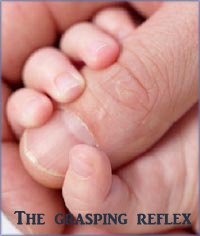 8 Newborn Reflexes
(Physical
Development)
8 Newborn Reflexes
(Physical
Development)
1) The Grasping Reflex
If you touch the palm
of your newborn's hand, he will automatically grasp your
finger.
Or, if you tickle the soles of his feet and he
will curl his toes.
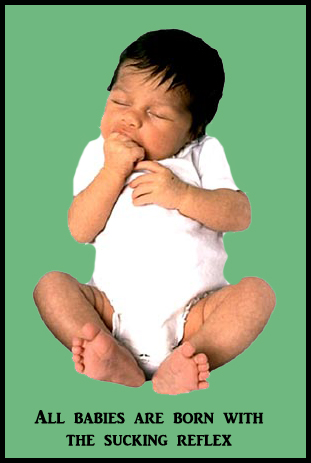 2) The Sucking Reflex
2) The Sucking Reflex
Babies love
to suck – not only do they find it soothing, but it is
necessary for proper feeding.
If you touch your
newborn's lips, you will notice this reflex is automatic. In
fact, your baby will probably suck on anything that comes near
his mouth, including your fingers, a nipple, or even his own
hand.
3) The Rooting Reflex
If you brush something gently against your
baby's cheek and he will probably turn his head toward the
stimulus.
New moms may find this very effective in
helping their newborn latch-on when breastfeeding.
4) The Gagging Reflex
While in the womb, your newborn was fed automatically, so
eating doesn't necessarily just happen, it is a new skill that
must acquired.
At first, your baby may suck too
quickly or gulp when he is really hungry.
The gagging
reflex protects your baby from choking while he is developing
the ability to eat and swallow properly.
5) The Moro Reflex
The Moro
reflex is also known as the "startle" reflex, and is a
neurological reaction that causes your newborn to throw out
his arms and legs with his fingers extended.
After a
few seconds, he will draw his arms into his body with his
hands clenched into fists.
This reflex is usually
brought about by an abrupt temperature change, a loud noise,
or a sudden shift in head position.
The Moro reflex
will usually disappear around 2 months of age.
6) The Walking Reflex
If you
hold your baby upright in a standing position with his feet on
a flat surface, you might notice that he moves his legs in a
stepping action.
7) Crawling Reflex
When your newborn is on his tummy,
he will automatically pull his knees up under his abdomen and
push his bottom up into the air as if assuming a crawling
position.
Sometimes, he may even be able to shuffle
forward by pushing or kicking his legs.
This reflex is
derived from a desire to curl up as if in the womb, and will
usually disappear around 2 months, or when your baby is able
to lie flat.
8) Tonic Neck
If you turn your baby's head to the left side
while he is lying on his back, you will notice that he might
throw his left leg and arm outward while flexing the right arm
and leg.
The opposite reaction occurs when the head is
turned to the right.
Newborn Sleeping Patterns (Physical Development)
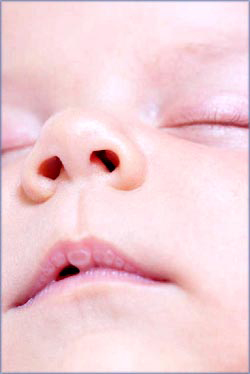 On average, as your baby is
very newborn he might sleep up to 20 hours a day. But as he
grows, this will decrease.
On average, as your baby is
very newborn he might sleep up to 20 hours a day. But as he
grows, this will decrease.
By the end of the first
month, your baby will typically be sleeping about 15 hours a
day, however, he may be awake and alert for 2-3 hours at a
time.
But remember again, these are just guidelines
about newborn development, not the objective truth!
For instance, my own son slept a lot the first couple of days
and from then on, hardly at all. Or at least that was how it
felt to me!
During the day he would only doze off a
couple of time for about 20-30 minutes.
And at night
he would wake up every hour and a half and demand his milk.
(If you have a baby that seems very demanding or particularly
sensitive, you might like this article about
my own experience
with my high
need baby
For the first few weeks of your
baby's life, sleeping is largely connected to feeding. Since
most newborns eat 5-8 times daily, your infant may only sleep
for a couple of hours before waking because he is hungry.
This can be exhausting, but remember that your baby's
tummy is only about the size of his fist, so he will need to
eat frequently to make sure he receives enough nutrients to
grow and develop properly.
As your baby develops, his
stomach will gradually be able to hold larger amounts, and
your baby will not need to eat as often. Although sleepless
nights may seem endless, it probably won't be long before your
little one is sleeping 4 or 5 hours in a row.
But
again, babies differ hugely. It took my son years to sleep
throughout the night.
So although it goes against many
popular theories and may go against your own desire to have
predictability and order in your life, it is important that
your newborn sets his own sleep schedule.
You see,
babies do not choose to stay awake or fall asleep. Their
bodies know exactly how much rest they need, and they will
sleep and wake according to these needs.
Infant Sensory Milestones (Physical Development)
Your baby learns
about his new world through what he sees, hears, tastes,
touches, and smells.
In fact, to help him experience
his environment and adapt to his new surroundings, he is
equipped with amazingly well-developed senses.
1) Sound - Don't Hold Back on Your Talking and Singing
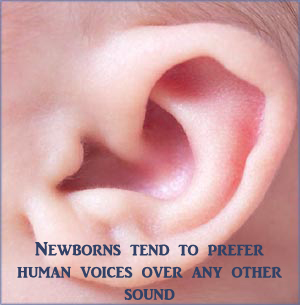 Babies can hear even before
they are born, which is why your little one will recognize the
sound of your voice from the moment he enters the world.
Babies can hear even before
they are born, which is why your little one will recognize the
sound of your voice from the moment he enters the world.
Talking to your baby immediately after birth will help
with the bonding process and make him feel safe and secure in
his new, unfamiliar environment.
Newborns tend to
prefer human voices over any other sound, so speaking or
singing softly to your baby will hold his interest and help
him develop both physically and cognitively.
At first,
he will not be able to turn his head toward a sound, but by
the third or fourth week, he will probably move his eyes in
the direction of a close-by voice or noise.
2) Taste and Smell - As Sharp as They Will Ever Be
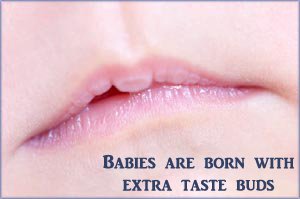 Babies are born with extra taste buds
so they have a very good sense of taste. In fact, taste and
smell seem to be linked and are often connected to people,
particularly the mother.
Babies are born with extra taste buds
so they have a very good sense of taste. In fact, taste and
smell seem to be linked and are often connected to people,
particularly the mother.
Your newborn will recognize
your scent and may turn his head toward you when you are
nearby.
Within a short period, your baby will begin to
associate your scent with the sound of your voice.
Several studies of newborn development have shown that
newborns prefer the smell of milk to that of sugar water and
will actually suck differently on a bottle filled with breast
milk than one filled with formula.
If given a choice,
most babies have a clear preference for the "sweetness" of
breast milk over formula or water.
3) Sight - Clearness and Sharpness Will Come over Time
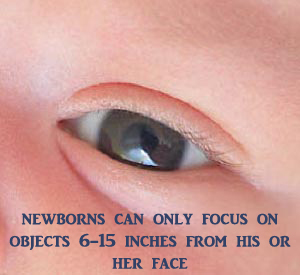 Your newborn will only be able to focus on
objects that are about 6-15 inches from his face, and he will
have a fixated gaze, meaning he will not be able to follow
movements with his eyes.
Your newborn will only be able to focus on
objects that are about 6-15 inches from his face, and he will
have a fixated gaze, meaning he will not be able to follow
movements with his eyes.
He will begin developing this
ability by the end of the first month.
Initially, eye
movement will be jerky, but fluidity will gradually increase
over time.
Most infants prefer brighter shades or
contrasting patterns and will focus for longer periods of time
on moving objects, such as a musical mobile rather than
stationary objects.
However, more than anything,
babies love to look at human faces, although at first they
will only be able to see the edges such as the chin, hairline,
ears, and accessories like hats or eyeglasses.
So,
give your baby lots of opportunity to stare at the people
closest to him, and consider putting a mirror in his crib so
he can spend some time becoming familiar with his own face.
4) Touch - Something Your Infant Cannot Get Enough of
Babies are very sensitive to
touch, and this is one of the best ways to encourage bonding.
In fact, research has shown that physical touch and
skin-to-skin contact is very important for infant development
and growth in all areas including cognitive and emotional
development.
- "If your baby was handed to you
immediately after delivery he may respond right away by
looking at you and perhaps suckling at your breast, and you
may feel a surge of love. Your baby will feel the closeness of
your body, identify your scent, hear the sound of your voice,
look into your eyes, and perhaps get the first taste of your
breast milk. All of these things will calm him and help him to
feel secure."
(Katy Holland, Your Baby From Birth to Six Months, page 16).
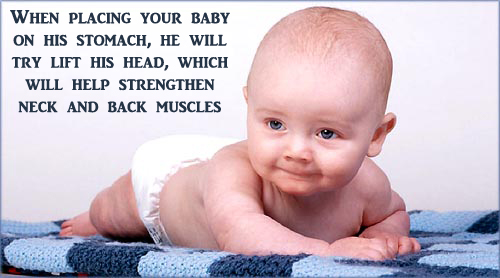
When your baby is first born,
his head will droop without support, his nervous system will
not be fully mature so his arms and legs will shake, his
breathing will be erratic, and his movements will be random
and purposeless.
If placed on his stomach, he will
lift his head, which will help strengthen his neck and back
muscles.
He will close his eyes in bright light, grasp
objects placed in his hands, and kick his legs in response to
stimulation.
The first month of newborn development is
a time of huge physical advancements, and you will notice
changes almost daily.
The Psychological and Cognitive Development of Your Infant
At first, the most common way your
baby will communicate is by crying.
It is the only way
he knows to get your attention and he will cry when he is
hungry, bored, uncomfortable, lonely, or just wants to be held
or cuddled.
Responding quickly and consistently to his
needs will help him develop trust and build a healthy
foundation for communication.
- "Each time you pick
him up, play with him, talk or sing to him, cuddle him, smile
at him, or soothe him, you are giving your baby information
about his world and what it means to be a human being. Above
all, you are teaching him that he is loved. This security give
him confidence to explore his environment, developing new
skills on the way, mainly by watching and copying you"
(Katy Holland, Your Baby From Birth to Six Months, page 38).
The first
month of your baby's life is a time of rapid change, and the
main way he learns is by spending time interacting with you.
He is like a thirsty little sponge, ready to absorb
not only the skills you teach him but also the emotions and
energy you emit towards him.
How to Communicate with Your Newborn
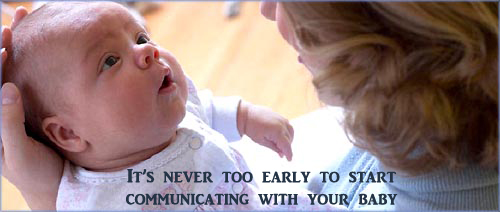
As you
hold your baby, you will notice that he watches your face
closely and will focus on your lips as you speak to him.
By the end of the first month, he might begin attempting
to copy your mouth actions and may even start making sounds as
if having a conversation with you.
Almost immediately
after birth, your baby will respond to the sound of your voice
and will quickly develop the ability to discern your facial
expressions as well as the tone and rhythm of your voice.
For example, your newborn may be tense and agitated if you
speak in anger or frustration, whereas talking in calm quiet
tones may help to relax him. He may stop crying when he hears
your voice or wiggle in excitement when you are near.
To help your baby develop language and communication skills,
you may spend a lot of time speaking to him in "focused" or
"directed" conversation. He will learn more if you talk to him
about something that he is already looking at rather than
chatting about things that he cannot see.
And the more
senses involved, the more impact the conversation will have on
cognitive development.
For example, describing a
rattle he can see, hear, and touch is much more interesting to
him than talking about grandma coming to visit or what daddy
does when he is at work. :-)
- "One of the wonderful
opportunities given to new parents is the chance to play with
their babies and to observe them while they play alone. A
baby's play has a serious purpose. During play, your baby
develops his physical, cognitive, emotional, and social
skills. Play is often critical to the formation of his
identity and personality"
(Growing With Your Baby: Pre-Birth to Age 5, page 112).
Within the first few
weeks following birth, your baby will begin imitating sounds
and mouth movements, will respond to specific tones and
voices, and will start connecting what he sees with what he
hears.
While it may be several months before you hear
your child speak his first word, there is
still a lot of cognitive and psychological development taking place
that is helping your baby build language and communication
skills.
The Emotional and Social Development of Your Infant
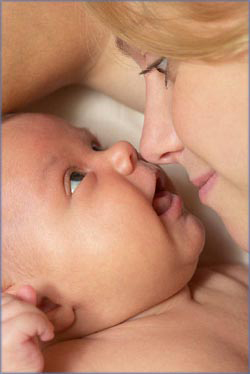 Your baby will
learn very quickly to recognize the tones and nuances of your
voice and will also be able to sense your mood and attitudes.
Your baby will
learn very quickly to recognize the tones and nuances of your
voice and will also be able to sense your mood and attitudes.
Reacting to the changing moods of those close to him
is an important prerequisite for learning how to respond in
various social situations later on.
Initially, a
newborn's social interaction will be based solely on his
desire to have his physical and existential needs met.
By using the basic principles of attachment parenting:
deep, intimate and intuitive
bonding with your baby, you will help him
feel secure and confident that he is unconditionally loved.
This includes responding to your baby's cries in a
positive, consistent manner and being there for him when he
needs – or wants you.
By the end of the first month, he
will begin to show other ways of socializing such as bobbing
his head, wiggling his body, or copying your movements.
If you stick your tongue out, you may notice that he will
mimic this action. He may even begin to follow you with his
eyes or respond with excitement when you play with him.
Working Towards Secure Attachment and High Self Esteem
As mentioned, it may seem
that your newborn only eats, sleeps, and cries, but the first
month after birth is actually a very important time of
development.
It is during this period of newborn
development that a sense of security, even self value and
self
esteem is established and much of the foundation is built
for future skills, abilities and self image.
Many
infant milestones are achieved – your baby will recognize your
voice and smell, will learn to read your moods and tone, will
lift his head when on his tummy, stick his tongue out or copy
other mouth movements, and use his reflexes to strengthen his
muscles and help improve his coordination.
He will
also learn how to adapt to his new environment, use his senses
to understand the world around him, and develop the ability to
handle the sudden and enormous increase in sensory stimulation
that he faces when leaving the womb.
That is a pretty
tough job list for such a little one – no wonder he often
sleeps so much!
And, even though he might not be awake
a lot, the best thing you can give him is your time.
Many child development experts believe that receiving
unconditional emotional support – love, full acceptance,
frequent cuddling, and existential security – is absolutely
essential in child development.
Nothing beats
unconditional love as the most powerful force in infant
development as well as later child development.
Your
Positive Parenting Ally,
Birgitte

Want to stay in touch and get the latest news?
Sign up
for my free newsletter
Parent Coaching
- For Inner Peace, Clarity and a Deeper Connection to Your Child
 Being a parent can feel like a double-edged sword. Life with kids may feel like the greatest gift you have ever received, while at the same being hugely challenging, often leaving you confused, stressed and overwhelmed.
Being a parent can feel like a double-edged sword. Life with kids may feel like the greatest gift you have ever received, while at the same being hugely challenging, often leaving you confused, stressed and overwhelmed.
When we feel like this, we've lost touch with ourselves. We can't hear our own inner voice, and it's difficult to know what is 'right' for us and how to act.
I offer in-depth parent coaching to help you regain your balance and get back in touch with yourself. From a place of inner peace and clarity, your will find your own answers which will help you reconnect with your child from a place of unconditional love and acceptance.
Read more about my parent coaching here.
Where Would You Like to Go Next?
Age Specific Child Development Articles
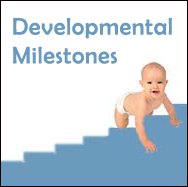 The Most Significant Developmental Milestones: Understand Your Child all the Way through the 6 Stages of Child Development. |
 In-Depth List of All the Baby Milestones Reached during the First Year: Exciting Insights into Physical, Psychological and Social Baby Development. |
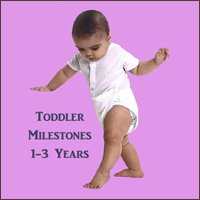 Inspiring Toddler Development Guide: A Long List of Toddler Milestones and Positive Parenting Tips for Parenting Toddlers. |
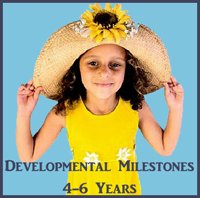 A Guide to the Early Child Development Stages and a List of Child Development Milestones from 4-6 Years. |
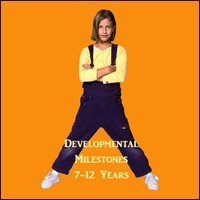 Stages of Child Development from 7-12 Years: A list of Physical, Cognitive and Social Developmental Milestones. |
 Teen Development and Adolescent Development: Physical, Cognitive and Social Developmental Milestones. |
Other Child Development Articles
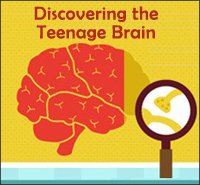 Judgment Call: Understanding the Teenage Brain. |
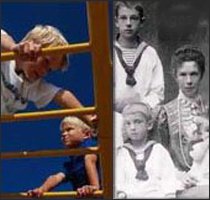 A Fascinating Journey into the Psychology of Children: From the Grand Masters' Fixation with Development Stages to the Context Focus of Today! |
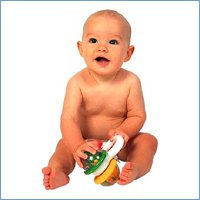 Jean Piaget's Object Permanence Developmental Stages: Theoretical Outline, Modern Critique and Parental Advice! |
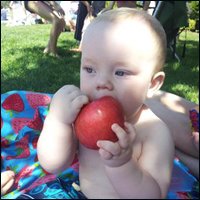 Keeping Track of Child Development Milestones: Spot Deviations like Early ADHD or Autism Symptoms. |
Back to the top of this page about A Newborn Development Guide about the First Physical, Psychological and Social Infant Milestones and How to Handle Them
Go to the Positive Parenting Ally Homepage







